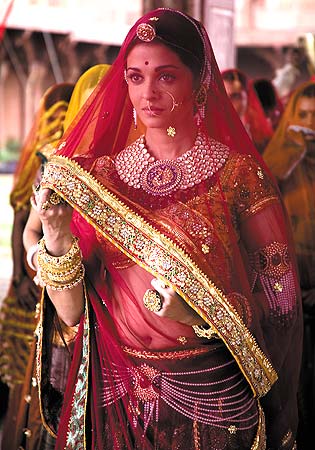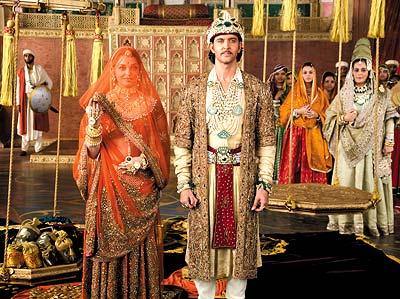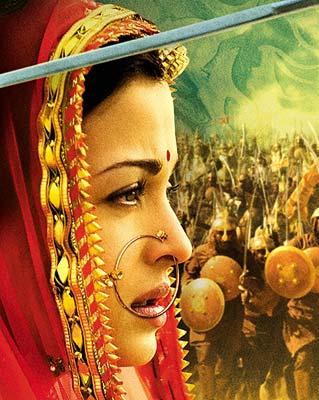A well-written part, which is very feminine and delicate, and a director (Ashutosh Gowarikar) with focus and clarity do not often come together, she tells Arthur J Pais, in an exclusive interview.

Ash plays a Rajput princess in the film, who becomes a reluctant bride to the Mughal king Akbar when she discovers that the marriage is a political move.
Read on as the 34-year old discusses her joy in working with co-star Hrithik Roshan, her admiration for Gowarikar and music composer A R Rahman, and what she expects from Robot, a sci-film she has just signed with Tamil superstar Rajnikanth.
What attracted you to Jodhaa Akbar?
When I heard that I could be playing Jodha, I was immediately intrigued. And anything that Ashutosh Gowarikar offers has to be substantial. The subject also intrigued me.
As I was going through the script, it became clear that the film is about a love story that has not been told before. In other films dealing with the Mughals, the relationship between Akbar and Jodha was taken for granted.

How is the love story of Jodha and Akbar different from the standard love stories?
This is the story of married love. It is pure and innocent. It is the discovery of true love only after marriage. Their love for each other grows despite some initial complications and political adversities. And the way Ashutosh Gowarikar has narrated it is both engaging and thrilling.
Were you worried about the film being a historical? Some people in the film industry may worry that a historical film may not be able to draw a large number of viewers?
I knew from the start that Jodhaa Akbar was not going to offer history lessons. I had watched Ashutosh's films, and wondered if we would work together some day. I trust him completely. I knew he was making a historical but history is just a background for an intriguing love story between two powerful people. I also thought the film has a contemporary edge to it.
What is contemporary about it?
The film is about the courageous decision a Rajput princess makes in marrying the enemy of her people. It needed incredible strength and courage for Jodha to make the decision in the interest of her people. Later, she worked very hard to make sure the relationship succeeded.
 In India, despite the concept of love marriages we have in urban centres, arranged marriages take place everyday. I would think 90 percent of all marriages in India are arranged in one way or the other. My parents and my brother also had arranged marriages. Many of these people have to work hard and use their emotional resources to make their marriages work.
In India, despite the concept of love marriages we have in urban centres, arranged marriages take place everyday. I would think 90 percent of all marriages in India are arranged in one way or the other. My parents and my brother also had arranged marriages. Many of these people have to work hard and use their emotional resources to make their marriages work.You look at Jodha and Akbar in the film and start thinking: they came together not under the happiest circumstances and yet, their marriage worked.
The film offers insights into relationships that are relevant today. Jodha and Akbar took great risks in their relationship. This film shows what might have gone in their minds and how they might have negotiated their life's journey.
This is your second film with Hrithik Roshan after the superhit, Dhoom: 2.
We have a similar approach towards acting and we enjoy diverse kind of films. We became good friends while working on Dhoom: 2.
We're fortunate to be working together in two films that are at the two ends of the spectrum. While Dhoom: 2 was an outrageous entertainment, Jodhaa Akbar explores an intense relationship between two dynamic people.
Gowarikar says seeing your work in the film makes him feel you are Jodha personified.

When a director says something like that, it goes to show his sensitivity and appreciation.
I have worked with some of the most seasoned filmmakers (including Sanjay Leela Bhansali in Hum Dil De Chuke Sanam and Devdas, Subash Ghai in Taal). But working with Gowarikar was quite an experience.
The script is detailed and focused. He has immense clarity and knows precisely where the film is going. He is very generous with the artists. He gets the best out of you.
More than anything else, I have come to respect him as a human being. I have watched him deal with everyone, from junior artists to stars with respect and consideration. The film required a lot of stamina and there were long spells of shooting. But because of Gowarikar's nature and Hrithik's presence, one never felt the stress.
This is one of the more complex roles you have taken up in your career. Did you wonder if you could do full justice to it?
I never approach a film with fear, rather I do it with excitement. That has been my work philosophy right from the start.

I was always there for a director, no matter how big or small the film. In the case of Jodhaa Akbar, I felt excited the moment Gowarikar mentioned the project. I knew immediately I was doing something extraordinary.
What is it like working in a film that had music by A R Rahman?
Like many of his films, the music in Jodhaa Akbar will take some time getting used to. But once it gets into your heart and soul, you won't be able to get it out. The way Gowarikar has used Rahman's music in Jodhaa Akbar will make you want to listen to it as soon as the film is over.
I have worked in many films where Rahman has done the music, starting from my very first film, Iruvar, which Mani Sir (Ratnam) directed over a decade ago.
Then, there was the song Barso Re in Guru which was picturised on me. Originally, Rahman had composed a nice tune which was supposed to be picturised on me riding a bicycle. But I fell off the bike and hurt myself. So a new situation for the song had to be created and Rahman came up with Barso Re.
Any new projects?
I'm doing Robot in Tamil with Rajni Sir (Rajnikanth), which I guess will be dubbed in many languages including Hindi and Telugu. Rahman will be composing the music for Robot.
I would also be working with director Shankar Sir again, after Jeans.
Courtesy: Rediff.com

No comments:
Post a Comment